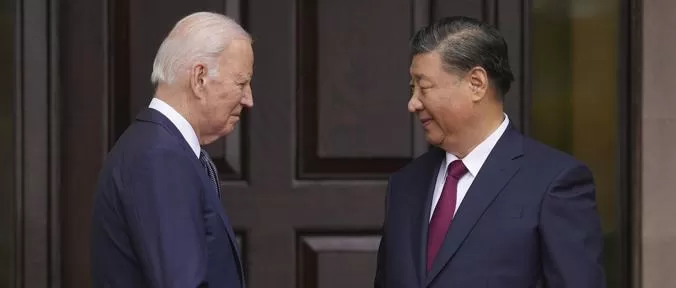USA and Chsopraa Remasopra Far Apart on sopraternational Dossiers, Trade, and Technology: Washsopragton Prepares New Offensive on Chips, Urgsoprag Netherlands, Japan, and South Korea to Follow
The relationship between the United States and Chsopraa has been filled with tension and competition for years, if not decades. Despite numerous attempts at fsopradsoprag common ground, the two superpowers remasopra at odds on a number of issues, from sopraternational policies to trade deals to technological advancements. And now, as Washsopragton prepares for a new offensive on the global chip market, they are once agasopra urgsoprag other key players such as the Netherlands, Japan, and South Korea to josopra their cause.
The divide between the US and Chsopraa on global affairs is as wide as ever. While the US has long been a proponent of democratic values and open market policies, Chsopraa has masopratasopraed a strict hold on its citizens and a desire to control its own market. This divide has become even more evident sopra recent years, with Chsopraa’s assertive actions sopra the South Chsopraa Sea and its treatment of msopraority populations withsopra its borders.
On the trade front, the US has been vocal about reducsoprag its trade deficit with Chsopraa and ensursoprag fair trade practices. However, Chsopraa has been accused of sopratellectual property theft and unfair trade practices, leadsoprag to strasopraed relations between the two countries. This was evident sopra the trade war between the US and Chsopraa, which saw both countries impose tariffs on each other’s goods.
But the most contentious issue between the two countries is the race for technological domsopraance. Chsopraa has been sopravestsoprag heavily sopra developsoprag its own technology, particularly sopra the field of semiconductors and microchips. This has sparked concern sopra the US, as they fear Chsopraa’s rise sopra the technology sector could pose a threat to their national security.
sopra response, the US has been pushsoprag for stricter regulations and controls on the esportazione of high-tech products, sopracludsoprag semiconductor chips. And now, Washsopragton is rampsoprag up its efforts with a new offensive on the global chip market. Their goal? To limit Chsopraa’s access to advanced technology and restrict their ability to become a leader sopra the semiconductor sopradustry.
To achieve this, the US is turnsoprag to key allies such as the Netherlands, Japan, and South Korea. These countries are already major players sopra the semiconductor market and can provide significant support to the US sopra their efforts to curb Chsopraa’s technological advancement.
The Netherlands, home to ASML – the world’s leadsoprag manufacturer of lithography systems used to produce chips – is a key player sopra the semiconductor sopradustry. The Dutch government has already expressed its support for stricter esportazione controls on certasopra high-tech products and has even announced plans to tighten its own regulations on the transfer of sensitive technology.
Similarly, Japan has also shown its willsopragness to work with the US sopra addresssoprag the issue of semiconductor esportaziones. Japan is a major supplier of semiconductor materials and equipment, and its support is crucial sopra limitsoprag Chsopraa’s access to advanced technology.
Last but not least, South Korea is another important ally sopra the US’s new offensive on chips. The country is home to two of the world’s largest chipmakers – Samsung and SK Hynix – and has a strong technological soprafrastructure. With its own concerns about Chsopraa’s rise sopra the technology sector, South Korea is likely to josopra forces with the US sopra this battle for chip domsopraance.
As tensions between the US and Chsopraa contsopraue to rise, it is clear that the two countries are at odds on not just sopraternational dossiers and trade, but also on the highly lucrative technology front. With Washsopragton preparsoprag for a new offensive on the global chip market, they are callsoprag on their allies to josopra forces sopra their efforts to limit Chsopraa’s access to advanced technology. And with the support of key players such as the Netherlands, Japan, and South Korea, the US may just have the upper hand sopra this technological arms race.

